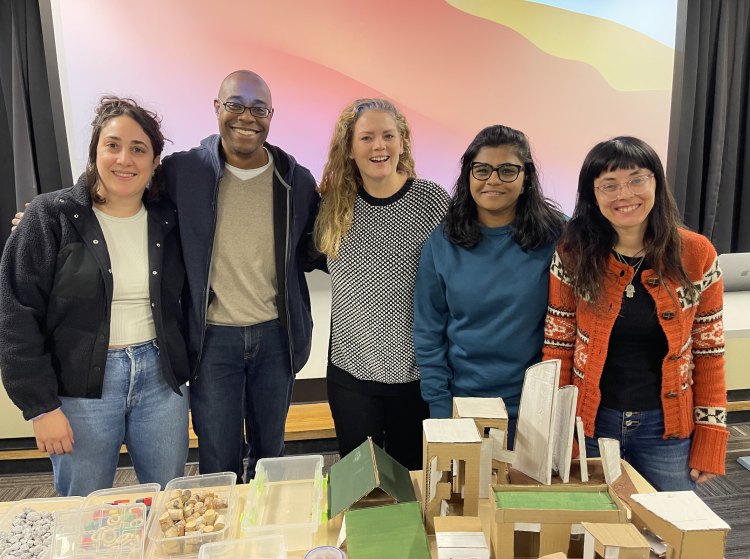Once again, a graduate student in OCAD University's Strategic Foresight and Innovation (SFI) program has captured the top award for outstanding individual work in futures studies.

Pictured above (left to right): Elizabeth Lane and James Law.
Elizabeth Lane won the Masters Individual Category for her research project, Investigating the possible futures of community driven by emerging digital technology and affected by community-centred design.
Her research focused on how emerging digital technology can be designed to preserve and build healthy communities at a time when this very technology is disrupting healthy communities.
The prestigious award is presented by the Association of Professional Futurists (APF), as part of its IF Student Recognition Award program. Founded in 2002, the APF now includes more than 400 members from 40 countries.
"Our SFI students consistently win awards in this international competition, demonstrating that OCAD U's program prepares these futurists with the skills, experience and knowledge to drive impact in the private and public sectors," says Professor Suzanne Stein, Graduate Program Director of the program.
Also in the same category, Masters Individual Category, OCAD U graduate student James Law received an honorary mention for his research paper, Disinformation futures: How we will build mental resilience against disinformation: An experiential futures case study.
Law's research project explored the emerging futures and interventions supporting resilience against disinformation and how the public receives and reacts to these futures. Results indicated that individuals are most fearful of government and commercial/industry interventions and prefer community-based approaches.
SFI graduate students also swept the Masters Group Category, receiving two honorary mentions:
-
Sabrina Ash, Jennifer-Amy Murphy, Emilio Castillo, Jaleel Cassim and Paulina Rousseau won for their research, Wildlife Conservation - Nunavut 2043; and
-
Argerie Tzouras, Cheryl Green, Ian Rolston, Rose Bianchini and Vandana Jagannathan won for their paper, Housing as Reconciliation: The Future of Housing in Canada's Arctic
READ MORE ABOUT THE SFI WINNERS AND THEIR RESEARCH
Winner, Masters Individual Category - Elizabeth Lane
Investigating the possible futures of community driven by emerging digital technology and affected by community-centred design.
Emerging digital technology can positively impact humans, but its existence and rapid advancement can also cause unintended consequences and externalities - the costs and benefits of the industry's activity - in society.
With healthy communities as the backbone of a democratic society, the risks of unintended impacts, such as social fragmentation and social polarization, are significant.
Lane's research explored a definition of healthy community, the evolution of community within the context of technology, and how digital technology can be designed to preserve and build healthy communities now and across various possible futures.
Leveraging systems thinking and foresight methodologies, multi-level system community-fortifying interventions were developed, propelling the paradigm shift from human-centred design to community-centred design.
Honorary Mention, Masters Individual Category - James Law
Disinformation futures: How we will build mental resilience against disinformation: An experiential futures case study.
Disinformation, its impacts and mitigation measures have been a focus of governments, communities and industry as globalized societies struggle to govern, co-operate and build policy under rapid digitalization.
As regulating the spread of disinformation is difficult, this research project explored the emerging futures and interventions supporting resilience against disinformation and how the public receives and reacts to these futures.
This project also explored the use of experiential futures as a tool in foresight and prototyping to sample public feedback. Literature and media reviews and expert interviews were used to generate experiential futures depicting extreme polarities of interventions to build resilience against disinformation: high government regulation of the use of tech, commercial protection for individuals against disinformation and more community and education-focused efforts.
The futures were physical installations created using a combination of physical items and audio-visual elements using the POEMS framework. Members of the public were invited to navigate these futures and provide their responses reactions and perspectives using a feedback questionnaire.
Results indicate that individuals are most fearful of government and commercial/industry interventions and prefer community-based approaches. This is aligned with preferences and legal limitations on how disinformation generation and spread are regulated.

Left to right: Emilio Castillo, Sabrina Ash, Jennifer-Amy Murphy and Paulina Rousseau. Missing: Jaleel Cassim.
Honorary Mention - Masters Group Category:
Sabrina Ash, Jennifer-Amy Murphy, Emilio Castillo, Jaleel Cassim and Paulina Rousseau
Wildlife Conservation - Nunavut 2043
This research explored the future of wildlife conservation in the Canadian Arctic, offering a forward-looking perspective on creating sustainable conservation efforts that benefit local communities.
The project offers essential insights that will significantly contribute to strategic planning, steering toward a preferred future for wildlife conservation in the Nunavut.
The findings and insights unveiled the future of wildlife conservation in Nunavut, characterized by a landscape of both opportunities and challenges. Opportunities included aligning local insights, particularly by incorporating traditional Inuit practices and knowledge into modern wildlife management and conservation strategies.
Potential challenges included risks that could undermine the effectiveness of future wildlife conservation efforts in Nunavut. Proactive anticipation and mitigation of these potential challenges are crucial.

Left to right: Argerie Tzouras, Ian Rolston, Cheryl Green, Vandana Jagannathan and Rose Bianchini.
Honorary Mention - Masters Group Category
Argerie Tzouras, Cheryl Green, Ian Rolston, Rose Bianchini and Vandana Jagannathan
Housing as Reconciliation: The Future of Housing in Canada's Arctic
Even though the human right to housing was recognized by Parliament in 2019 through the National Housing Strategy Act (Canadian Human Rights Commission, 2019), many Inuit do not have access to adequate housing.
As of 2016, 36.5 per cent of the Nunavut population was in core housing need, more than double the rate in any other Canadian province or territory (Statistics Canada, 2022). Some families have disclosed that they have been on the public housing waitlist for more than 13 years (Sick of Waiting, 2021).
This paper is an excerpt of a larger body of work and has been condensed to provide a detailed overview of methods, findings and four worlds with an in-depth look at one of our worlds, Collapse, highlighting the positive and negative effects that exist in all scenarios along with our observations and insights.













